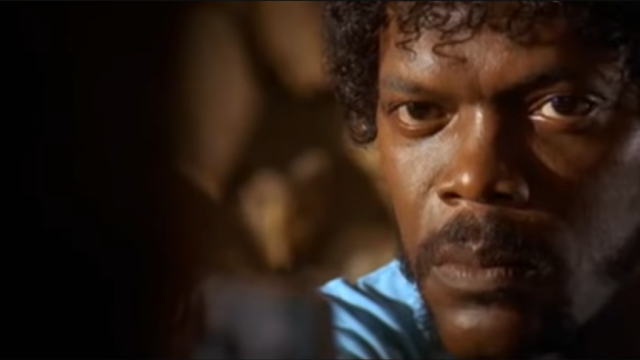However much Quentin Tarantino may talk about Inglourious Basterds being his masterpiece and Once Upon A Time… In Hollywood being his final stamp on his career, it’s a fact that Pulp Fiction will forever be the movie he’s remembered and beloved for. I suspect Tarantino has a far greater belief in his power to control his legacy than he actually possesses, though I also suspect this is a big part of his creative process and something that leads to his movies being cool to me; I think he asks himself what would be the most interesting story for Quentin Tarantino to tell right now. It’s what makes all of his movies feel like Events – that’s what he believes they are, and so he makes his choices very carefully, and he separates out those choices so that you can see all of them and take them in. Compare to his brother-in-arms Robert Rodriguez, who is gleefully making his choices as carelessly as possible. Tarantino commits to solving a specific cinematic problem and he works out his own solution to it. On the one hand, it’s a tremendous pleasure to break down all his choices and how they work; on the other, it’s a tremendous pleasure to immerse myself in what he calls the ‘half-assed operatic’ tone.
Pulp Fiction has become something of a symbol – if you go around telling people it’s your favourite movie, there are many who will immediately peg you as a pretentious asshole in the White Male vein; you’re a guy who doesn’t just talk about movies too much, you spend much of that time repeating clever things you heard other white men say about movies in the vain hope of being interesting. Furthermore, your taste in movies is largely confined not just to a bunch of white guys but to their most violent and propulsive movies; you probably think Jackie Brown is boring. Perhaps worst of all, you take yourself and your personal taste with the utmost seriousness; when people tell you they don’t care for Pulp Fiction, you react with moral outrage, and movies you don’t like aren’t just not to your taste or even just bad but actively evil. The flipside to this is that I’ve started to see people who say “I don’t trust anyone who says Pulp Fiction is their favourite movie” the same archetypal way. It’s not that I don’t see where they’re coming from – there are plenty of Pulp Fiction fans who fit that exact archetype, and I’ve found them just as exhausting or frustrating, and hell, I’ve been that guy from time to time, spiritually if not in fact. The thing is that I’ve seen enough people repeat that observation enough to spot when the person saying it is sincerely expressing frustration and when they’re, you know, repeating something they heard someone more clever than them say in an attempt to sound interesting or when they just don’t like violent movies or are taking their taste too seriously.
Which is funny, because until OUAT…IH, Pulp Fiction was the most laid-back entry in the Tarantinoeuvre. As three short stories and two fragments, it has a real Day In The Life tone to it; the fact that each individual story has peaks and valleys does not undermine that, and in fact turns it into particularly interesting Days In The Life. Most of the characters start their stories enjoying positions of enormous power, and I very much use the word enjoying intentionally. Vincent and Lance look over Lance’s drugs as Tastemakers who have the deep knowledge to tell the good shit from the bad. Marcellus and Mia Wallace are King and Queen of his criminal empire. Honey Bunny and Pumpkin are expert robbers who are sick and fucking tired of incompetence and ready to get some real work done. It makes it more exciting and shocking when they lose, but it’s also inherently pleasurable to empathise with them in the first place. They’ve been doing this a long time, and therefore so have we. This movie being a minor culture war is funny partly because, of all of Tarantino’s movies, this is the closest to a pure comedy.
It’s also funny because the same movie has a moment of spiritual catharsis that makes the problem of someone talking about a movie in an annoying way seem petty and inconsequential. The largest emotional arc in the movie is Jules undergoing a spiritual crisis. He witnesses something that he takes as a sign to reevaluate his life and what he values, finding that he’s not completely happy with the things he does, and decides to change his behaviour – starting with an action he chooses not for its real, practical effect, but for its symbolic meaning. Part of what makes Tarantino so beloved is his ability to inject his images with grand, masculine archetypes; the climactic scene is a moment of Redemption through force. Conversely, Vincent retroactively comes off as someone who could have redeemed himself but chose not to; the destruction of his dignity in the first chapter and his death in the second read as what he suffers for missing the signs. Seeing one guy lose a battle for his soul because he didn’t know he was fighting for it and one man walk into the sunset… some douchebag being wrong seems kind of petty after that.
“You’re the weak, and I’m the tyranny of evil men. But I’m tryin’, Ringo. I’m tryin’ real hard to be the shepherd.”

